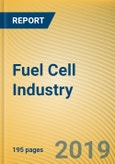Fuel Cell Vehicle will be the Fastest-Growing Automobile Market Segment Worldwide Before 2050.
The thriving research on fuel cell is a result of global fossil fuel resources to be exhausted within a century.
Hydrogen fuel cell as a kind of renewable resource has plenty of merits:
- An energy conversion efficiency of as high as 50%-60%
- Zero pollution, zero emission
- Modular design, low maintenance cost
- Many ways to produce hydrogen fuel since hydrogen is the most fundamental element in nature.
Global total sales of hydrogen fuel cell vehicles including passenger cars and buses exceeded 10,000 units between 2013 and 2018. Global ownership of fuel cell vehicles will surge to 5.01 million units in 2032 from 10,000 units in 2018, and sales revenue will soar from USD400 million in 2018 to USD255.2 billion in 2032, with an accumulative total of USD1.2 trillion during the period.
Global fuel cell market will be worth RMB328.1 billion in 2025, including RMB2 billion of the portable type, RMB141.9 billion of the fixed type and RMB184.2 billion of those for transport equipment. Fuel cell vehicle market will boom after 2020.
By the end of 2018, there had been more than 13 cities in China working on demonstration and promotion of fuel cell vehicles, including Yunfu City and Foshan City in Guangdong, Chengdu in Sichuan, Shanghai, Beijing, Zhangjiakou in Hebei, Xinbin Manchu Autonomous County in Liaoning, Wuhan in Hubei, Zhengzhou in Henan, Rugao City, Yancheng City and Suzhou City in Jiangsu, and Datong City in Shanxi. Vehicles piloted in these cities cover fuel cell buses, fuel cell coaches, fuel cell light buses and fuel cell logistics vehicles.
Among the 1,527 units of fuel cell vehicles sold in China in 2018, 1,418 units, or 93% of the total, were fuel cell buses; 109 units, or 7% of the total, were fuel cell trucks. It can be seen that buses were the mainstream product. In 2018, China’s shipments of fuel cell stack for vehicles approximated 50MW, and key suppliers were Sunrise Power Co, Ltd, Shanghai Re-Fire Technology Co, Ltd, Bing Energy Inc. and Beijing SinoHytec Co, Ltd.
Fuel cell vehicle market will take off after 2020, with its annual sales expected to post 3 million units around 2030.
Global and China Fuel Cell Industry Chain Report, 2019-2025 highlights the following:
- Fuel cell (classification, applications and development trends)
- Global fuel cell industry (overview, patent, shipments, market size, etc.)
- Fuel cell development in Japan, South Korea, Europe, the United States, China, etc, and the gap between the Chinese market and the global market;
- Global fuel cell vehicle industry chain (including fuel cell system, cell stack, components, hydrogen fuel, etc.) (mainstream suppliers, technology, cost, etc.)
- 7 global fuel cell system manufacturers (operation, technology, development plan, and output & sales)
- 10 Chinese fuel cell system manufacturers and 10 suppliers on the industry chain (operation, technology, development plan, and output & sales).
This product will be delivered within 3-5 business days.
Table of Contents
Companies Mentioned
- Ballard Power
- Beijing Azure Hydrogen Energy Science & Technology Co, Ltd.
- Beijing Nowogen Technology Co, Ltd.
- Beijing SinoHytec Co, Ltd.
- Bing Energy Inc.
- Bloom Energy
- Dongfang Electric (Chengdu) Hydrogen Fuel Cell Technology Co, Ltd.
- Dongyue Group Co, Ltd.
- FuelCell
- Guangdong Sino Synergy Technology Co, Ltd.
- HYGS
- Hynertech Co, Ltd.
- Jiangsu Horizon Fuel Cell Technologies Co, Ltd.
- Jiangsu Huachang Chemical Co, Ltd.
- Plug Power
- SFC Power
- Shanghai 3F New Materials Technology Co, Ltd.
- Shanghai Fuel Cell Vehicle Powertrain Co, Ltd.
- Shanghai Re-Fire Technology Co, Ltd.
- Shanghai Shenli Technology Co, Ltd.
- Shanghai Sunwise New Energy Systems Co, Ltd.
- Shanghai TL Chemical Co, Ltd.
- Sino-Platinum Metals Co, Ltd.
- Sunrise Power Co, Ltd.
- Wuhan WUT New Energy Co, Ltd.
- Zhongshan Broad-Ocean Motor Co, Ltd.
Methodology

LOADING...








